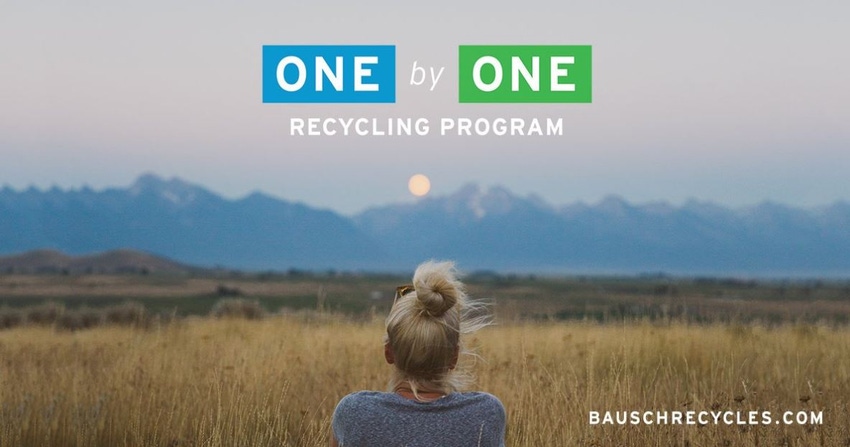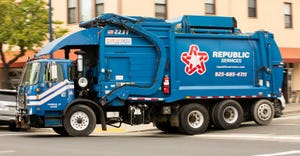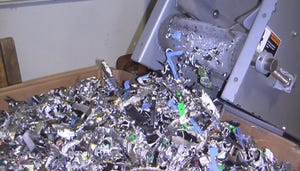Recycling Program Puts Focus on Contact Lens Waste
Bausch + Lomb’s program has recycled more than 31,000 pounds of contact lenses and packaging materials.

“Did you know the end-to-end trail of waste generated annually in the U.S. from contact lens packaging could circle the Earth three times over?” That’s according to a video from contact lens manufacturer Bausch + Lomb. Disposable contact lenses, while extremely convenient for users, create an inconvenient waste problem.
Bausch + Lomb, through a partnership with TerraCycle, provides the only sponsored recycling program for contact lenses and related packaging available in the U.S.
“The waste generated by contact lenses, especially daily disposables, became a concern of ours. That is why we provided consumers with an opportunity to take a small step each day to make a positive impact,” says Amy Butler, vice president of worldwide environment, health, safety and sustainability at Bausch + Lomb.
The volume of the challenge was great. Approximately 15 million people in the U.S. wear daily, disposable contact lenses. When they are done, many users flush the lenses.
“A recent study conducted by researchers at Arizona State University found that 15 to 20 percent of contact lens wearers flush their contact lenses down the sink or toilet, contributing to up to 3.36 billion contact lenses in our oceans, lakes, streams and other parts of our environment,” says Butler.
The Bausch + Lomb ONE by ONE Recycling Program, which launched in 2016, has recycled more than 5 million units, or 31,000 pounds of contact lenses and packaging materials, says Butler.
The recycling program aims to help people rethink how they dispose of the products and seeks buy-in from contact lens wearers and the eye care professionals who can opt in their offices as collection points.
The program collects contact lens waste, which includes contact lenses, top foil and opened plastic blister packs from any brand. People can either take their waste to any of the participating eye care offices, of which there are nearly 3,000, or they can mail them in using a prepaid shipping label (available at BauschRecycles.com). The materials are then received by TerraCycle and recycled into post-consumer products.
When a participant sends a shipment to TerraCycle, the package is checked in and weighed, and tracking data is entered into a database for the ONE by ONE Recycling Program. Once a critical mass of material is collected, the collections are sent for manual separation, where any noncompliant materials are then removed.
“After manual separation, the remaining material is shredded, and the blister pack foil lids are separated from the plastic materials through sink-float density separation. The plastic is melted and extruded into plastic pellets,” says TerraCycle CEO Tom Szaky. “Additional metal material can be filtered out during the extrusion process. The foil lids and metals from the blister packs are sent for smelting and metals recycling.”
Once recycled, the plastic materials can be turned into a variety of products such as park benches, picnic tables, playgrounds, lumber for garden beds and waste receptacles.
“Recycling contact lenses helps to keep contact lens waste out of landfills, as well as oceans, lakes, streams and other parts of our environment. Additionally, new materials and products will be made with the collected waste, reducing the need to extract new materials from the planet,” says Szaky. “This avoided impact is not small; for an average product, over 90 percent of the environmental impact comes from extracting and refining the raw materials from which it is made.”
In addition to its important environmental benefits, the One by One program has a charitable goal as well. “On top of the benefits of reducing waste for a more sustainable environment, $1 is donated to Optometry Giving Sight for every pound of accepted packaging sent in through the program with a minimum shipment weight,” says Butler.
Optometry Giving Sight is a global fundraising initiative that helps prevent blindness and vision impairment in people who do not have access to eye examinations and glasses.
With thousands of consumers and eye care specialists on board already, Bausch + Lomb aims to keep growing the program and now offers a more sustainable contact lens option, with its new Biotrue ONEday disposable contact lenses. “Biotrue ONEday contact lenses inspired us to launch this program, given the amount of waste generated,” says Butler. “We searched to provide a new solution to allow consumers and eye care professionals to have sustainable practices and help protect our planet.”
About the Author(s)
You May Also Like


